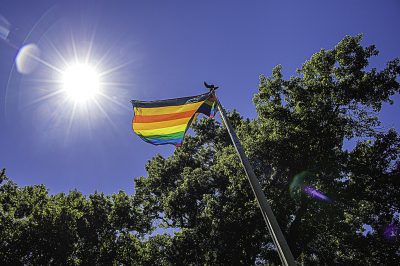
Boston lawmakers deemed Monday a day of honor for LGBTQ+ military personnel, celebrating the 10th anniversary of repealing “Don’t Ask, Don’t Tell” — a U.S. policy that prohibited LGBTQ+ service members from revealing their sexual orientation or they would face expulsion.
Via a Sept. 15 resolution offered by Councilors Ed Flynn and Liz Breadon, the city designated Sept. 20 as “Always Ask, Proud to Tell Day,” officially recognizing over 13,000 military personnel discharged because of their sexual orientation until the 2011 policy cancellation.
“On this day and every day we must commit to honorably recognizing the identities of all of our LGBTQ+ service members and affirm an environment and culture where they may serve openly, without retribution, and attain acceptance and honor,” Breadon was quoted saying in a press release.
Flynn, a sailor in the U.S. Navy and U.S. Navy Reserve for more than two decades, said in a Sept. 17 press release that the LGBTQ+ officers he served with in the military “deserve to be honored and treated with dignity.”
“Our LGBTQIA+ veterans and service members have made tremendous sacrifices in order to serve our country, and they deserve to openly be who they are without fear,” Flynn was quoted saying in the release.
The policy, enacted in 1993 by President Bill Clinton, was seen at the time as a step forward from the complete ban on LGBTQ+ service members in effect since World War II. But in practice, it often led to witch hunts for closeted LGBTQ+ military members and inhospitable conditions, said Transgender Rights Project Director at GLBTQ Legal Advocates & Defenders, Jennifer Levi.
“If somebody suspected somebody of being gay or lesbian, they could be reported for misconduct,” Levi said, “They would be investigated, they oftentimes faced brutality from other service members, and thousands of people who had been serving were discharged under really hostile circumstances.”
The “Always Ask, Proud to Tell Day” resolution passed unanimously in the City Council and was crafted in partnership with Veterans’ Services Commissioner Rob Santiago, Boston’s first openly LGBTQ+ Commissioner in history.
“To me personally, as a gay man myself who had served during that time, I got to tell you it was more of a smoke screen,” Santiago said. “It was just a way to basically appease those who didn’t want to just say, ‘Hey, if you’re gay, you could serve.’”
Like Flynn, Santiago was also a sailor of more than two decades, serving on four warships on tours such as Operation Iraqi Freedom. He said a powerful memory for him was when asking service members about their sexual orientation at an event last year onboard the U.S.S. Constitution, his final station before retiring in 2008.
“It was eight or nine sailors, both male and female, that raised their hands,” Santiago said. “That was a very impactful moment for me because 10 years ago, I couldn’t raise my hand while I was on the Constitution identifying myself as a gay man.”
Though the repeal took effect during President Barack Obama’s Administration, the progress LGBTQ+ advocates made since then was briefly disturbed by President Donald Trump issuing a ban barring transgender individuals from serving in the armed forces, according to Levi. The ban was overturned by President Joe Biden Jan. 25 of this year.
“Because of the interference during the years of the Trump administration, there also continue to be barriers to transgender people enlisting, mostly because of the confusion that was sewn over the years, the shifts in policy and because of this perception and misunderstanding about transgender people’s lives,” Levi said.
No matter the Trump-era decisions, Levi explained how the legacy of “Don’t Ask, Don’t Tell” remains a reality for some LGBTQ+ veterans seeking to correct their official discharge documentation.
“There were people who were denied post-service benefits because of the nature of the discharges that they faced,” they said. “There are people who continue to have paper records that reflect dishonorable and less than honorable service, which was completely inaccurate and has continued to impact people in employment and beyond after their service.”
Regardless of veterans’ discharge, Santiago encourages all returning service members to contact his office and see what benefits could be available to them.
In addition to overturning discriminatory characters of discharge, Santiago said he views the possibility of an executive branch that reverts to the Clinton Administration standard as the biggest potential challenge for today’s LGBTQ+ armed service members.
“One thing that would be a challenge for openly gay service members is if the President of the United States changes the law,” Santiago said. “That would always be in the back of my head if I was serving today is, in the drop of a dime, the President and Congress could go back and reinstate ‘Don’t Ask Don’t Tell,’ or worse, a flat out ban on homosexuality.”
Dixon Osburn, author of “Mission Possible: The Story of Repealing Don’t Ask, Don’t Tell,” said current conversations within the armed forces center around recognizing LGBTQ+ personnel within the chain of command and ensuring each branch remains free of discrimination.
“Repeal has really been done without incident,” Osburn said. “It has just been transformative for the military which we know is now benefiting from the services of LGBT service members who are able to serve fully and with authenticity.”












































































































